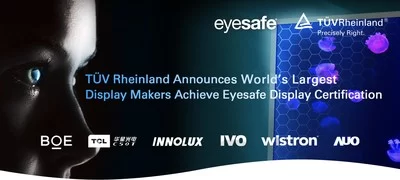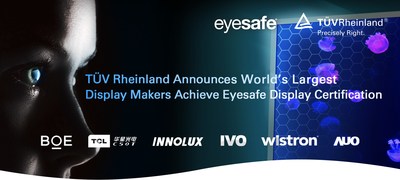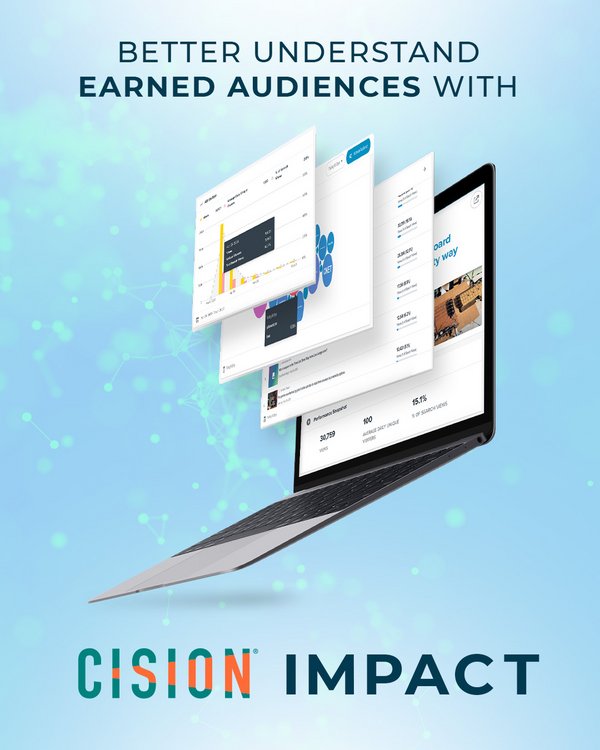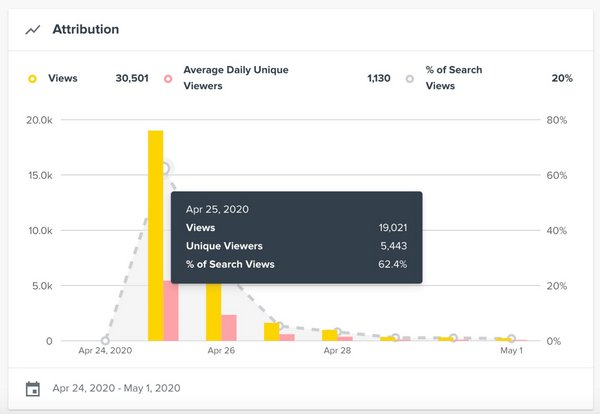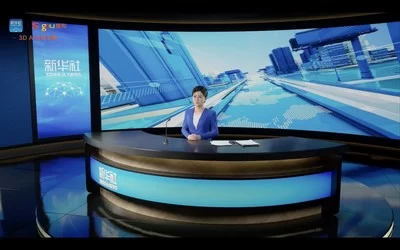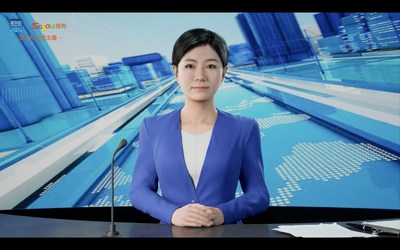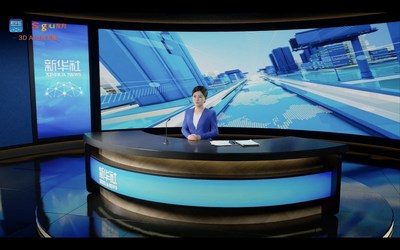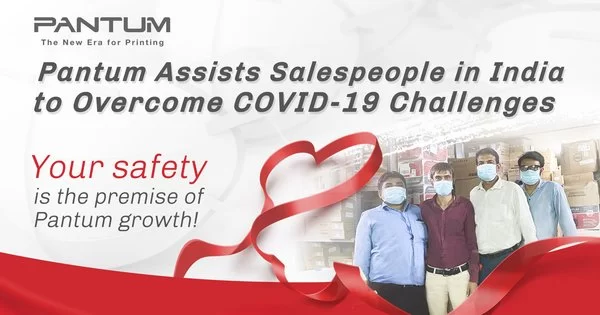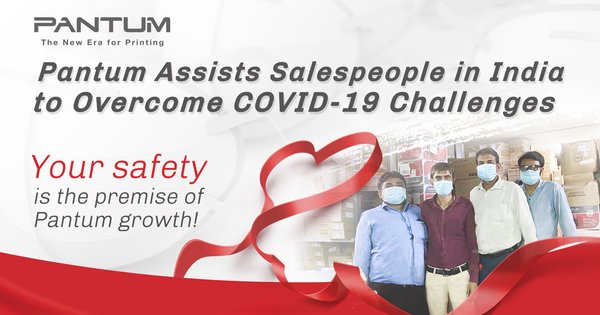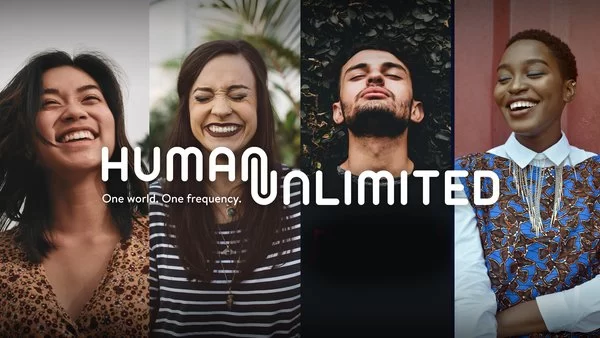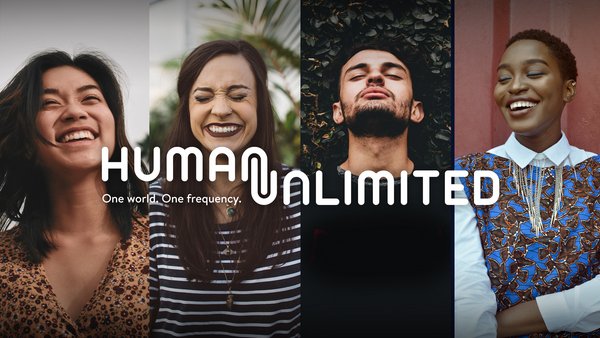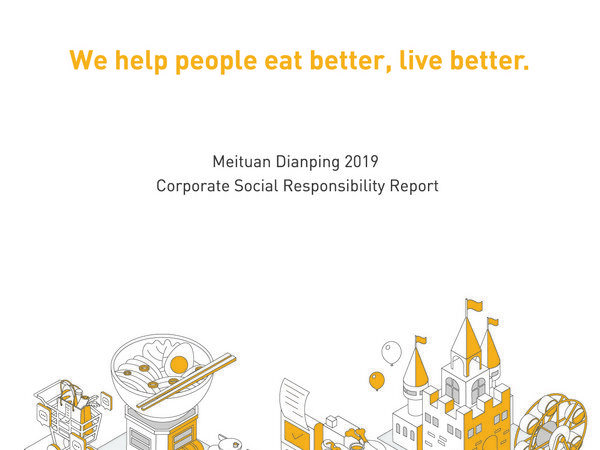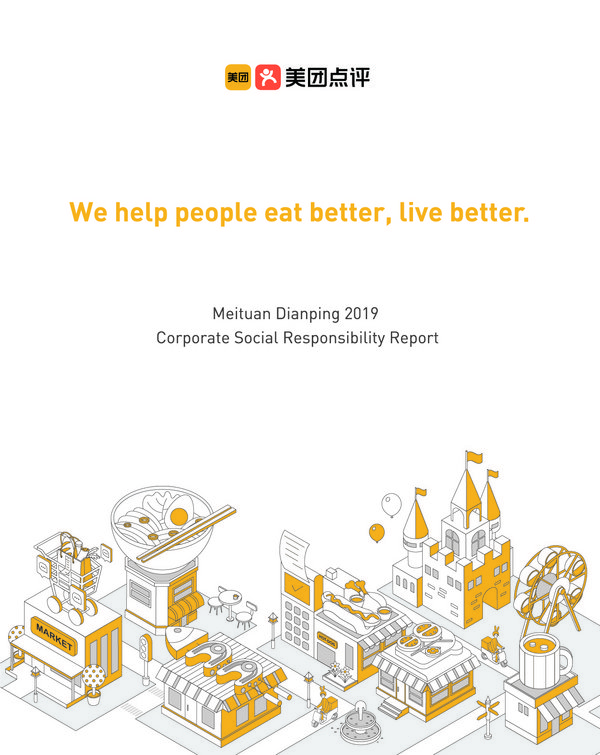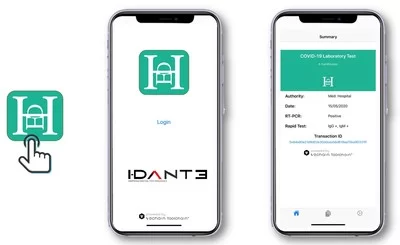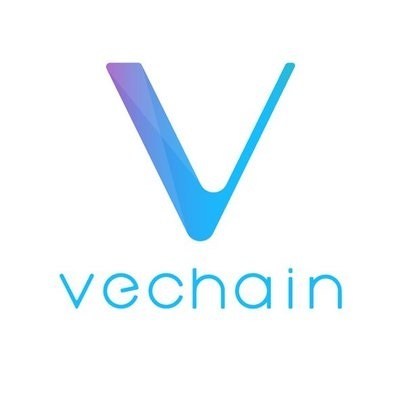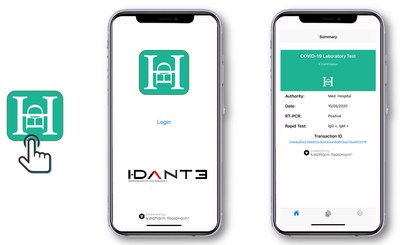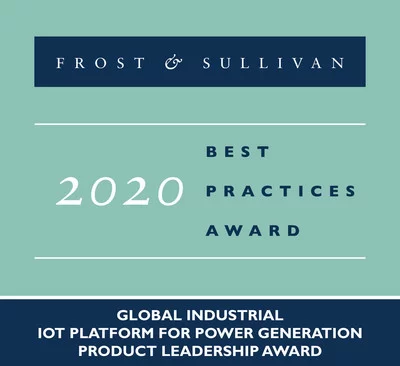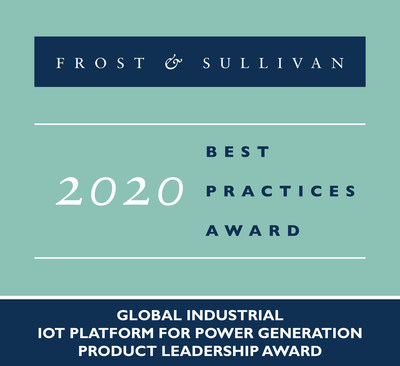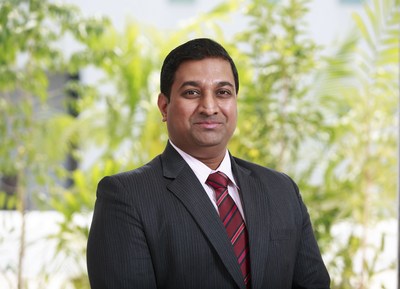At “The Future of Low Blue Light Displays” event, Eyesafe Display certification announced for display manufacturers BOE, TCL CSOT, Innolux, IVO, Wistron and AUO
SHANGHAI, May 21, 2020 /PRNewswire/ — On May 20, 2020, the international independent third-party testing, inspection, and certification organization, TUV Rheinland Group (TUV Rheinland) and Eyesafe, the leader in new technology research & development on blue light management, announced that display manufacturers BOE, TCL CSOT, Innolux, IVO, Wistron and AUO have achieved Eyesafe Display certification, the industry’s standard for low blue light and color performance management. The Eyesafe Display standard is the world’s leading set of health-based requirements for the consumer electronics industry, developed in conjunction with over 250 leading ophthalmologists, optometrists, and engineers who have been conducting and analyzing clinical health and safety research on the impacts of exposure to high-energy blue light. TUV Rheinland also announced that display manufacturer Panda has panels that are in the process of being certified, and should be able to bring certified panels to market later this year.
"Today’s announcement that the computer electronics supply chain is coalescing around a single unified standard for blue light management is an important milestone for the industry," said Gene Munster, the Managing Partner at investment firm Loup Ventures and a prominent voice on emerging trends across the technology sector. "With average screen time now reaching unprecedented levels and showing no signs of abating, it’s more important than ever that consumer brands have an easy-to-understand standard like Eyesafe for addressing consumers’ health and safety concerns."
Consumer and industry-wide interest in low blue light solutions and standards has dramatically increased in recent years, forcing many companies to pursue their own low blue light management hardware and software solutions, which has resulted in significant confusion in the marketplace about the differences in the various solutions and standards. By adopting industry-leading standards that display manufacturers can certify against, TUV Rheinland is bringing much-needed order and consistency to the marketplace, creating uniform standards and a more comprehensive means for the industry to talk to end-consumers about the health impacts of toxic blue light.
Today’s announcement comes just over two months after TUV Rheinland announced that it would begin certifying against the Eyesafe Display standard. The announcement comes on the heels of significant data pouring in from across the globe on rising levels of screen time by end-consumers. The average amount of hours spent in front of displays, which has been growing at alarming rates in recent years, has spiked significantly as shelter-in-place, work-from-home and eLearning mandates have proliferated around the globe. In the US, a recent Nielsen study indicates that average screen time is now exceeding 13 hours a day.
"Ever since announcing in early March that we would begin certifying displays against the Eyesafe Display Standard, demand from across the panel manufacturing sector has been outstanding," said Kalyan Varma, Vice President of TUV Rheinland, Business Field Electrical, Global, at the launch. "There was clearly pent-up demand for industry-wide standards for low blue light and color performance management. Today’s announcement, which brings together many of the leading panel suppliers in the world, shows that the industry is serious about the health and safety of the end-consumers. TUV Rheinland is excited to be playing a leading role in consolidating industry support around a single, best-in-class standard."
"In the current information age with high-speed development, display panels are widely used as an interface for human-computer interaction," said Wu Yanbing, Vice General Manager of MNT SBU at BOE. "As consumers use monitors for longer periods and at a younger age, their demands for eye health protection are becoming stronger. BOE has always been people-oriented, and is committed to bringing users a better experience. We have a total of seven products that passed testing this time, and more products will be launched in the future. BOE will work with TUV Rheinland and Eyesafe to provide users with healthy, high-quality products."
"TCL CSOT will adhere to the strategy of becoming a global leading intelligent technology company," said Li Dongsheng, founder and Chairman of TCL. "Announcing that our devices and panels will now meet the best-in-class Eyesafe Display certification sends an important message to our supply chain partners. This is a very momentous day for our company, and it marks a major achievement by our engineering and product teams."
"Innolux has been committed to the development of low-blue display products since 2015," said James Yang, General Manager of Innolux. "The Eyesafe Display standard not only sets a new milestone for consumer electronics products, but also makes outstanding contributions to all consumers and our descendants. We will continue to cooperate with TUV Rheinland and Eyesafe, expanding the application of a full range of products, and contribute to the future development of the display industry."
"We are very pleased to be able to partner with TUV Rheinland and Eyesafe in this endeavor," said Tao Yuan, Chairman and President of IVO. "Our partners in the consumer electronics business have made it clear that low blue light protection is going to be an ongoing requirement in all new products, and we are now ready to provide them with Eyesafe Display certified components. Today’s announcement marks a significant pillar in our long-term strategic growth plan throughout the display sector."
"Wistron is honored to announce that our panels have achieved the best-in-class Eyesafe Display certification, which represents a huge leap forward in product development," said Jeff Lin, CEO of Wistron Technologies, Wistron Corporation. "Today’s news also conveys our commitment to consumers’ health and safety. Gaining the Eyesafe seal of approval marks a milestone for our engineering and product teams."
The panel makers that have their products certified by TUV Rheinland to meet the Eyesafe Display requirements, BOE, TCL CSOT, Innolux, IVO, Wistron and AUO, in addition to Panda which is in the process of meeting the TUV Rheinland Eyesafe Display certification and plan on bringing Eyesafe Display certified panels to market later in 2020, collectively account for over 60% of the world’s display manufacturing for desktop monitors, all-in-one PCs, and laptops.
The Eyesafe Display Standard is an industry-leading set of requirements available for all manufacturers across the display industry. Products that have passed the Eyesafe Display Standard requirements will receive a Certificate (Certificate of Conformance) issued by TUV Rheinland, including the test report. Consumers can obtain information on certified products on the TUV Rheinland certificate database Certipedia, which helps facilitate consumers’ understanding of a product and enhance confidence in the purchase. With TUV Rheinland Certificate, all manufacturers can apply for using the Eyesafe Display label authorized by Eyesafe®.
"The Eyesafe mark represents a commitment to health and safety by the largest device manufacturers in the world, and we are proud to support their efforts in collaboration with leaders in healthcare," remarked Justin Barrett, CEO of Eyesafe, the healthcare research, technology and advocacy firm responsible for developing the standard. "Today’s announcement not only brings tremendous amount of clarity to the marketplace, but also ensures that the global standards for managing toxic blue light emissions and color performance are driven by healthcare, clinical research and scientific study."
The repercussions of today’s announcement extend far beyond the largely Asia-based consumer-electronics supply chain; with Eyesafe emerging as the global marquee standard for low blue light emissions, government and policy leaders, regulators, insurance executives and the research community sees far ranging implications.
"The Eyesafe Display Standard was designed in consideration of the leading published research relating to the most toxic portions of the blue light spectrum and the human eye," said Dr. David Friess, an internationally-recognized optometrist and member of the Eyesafe Vision Health Advisory Board, the entity responsible for advising the Eyesafe engineering team on the health components of the standard. "It is gratifying to see the display technology industry rapidly move towards adopting this new standard to bring improved display solutions to market based on clinical health research which ultimately benefit consumers."
About the Eyesafe Display Standard
Supported by the Eyesafe Vision Health Advisory Board, the Eyesafe Display requirements are based on the growing body of research that suggests potential health impacts of blue light exposure and the consumer electronics industry’s requirements for accurate color performance. The Eyesafe Display Standard has been developed to provide transparency to consumers and is further built upon existing standards and guidelines developed by the American National Standards Institute (ANSI), the International Commission on Non-Ionizing Radiation Protection (ICNIRP), Eyesafe and TUV Rheinland.
Recent studies have shown growing concerns over potential long-term eye health impacts from digital screen usage and cumulative blue light exposure, in addition to recognized impacts of device use on circadian rhythms and sleep patterns. Blue light exposure research and studies on animals’ cells have shown that blue light in a range of 415 to 455 nm generated the greatest phototoxic risk to retinal pigment epithelium cells, with photoreceptor cell apoptosis seen early after the retina is damaged by blue light*.
About TUV Rheinland
TUV Rheinland is a global leader in independent inspection services, founded nearly 150 years ago. The group maintains a worldwide presence of more than 20,000 people; annual turnover is EUR 2 billion. The independent experts stand for quality and safety for people, technology and the environment in nearly all aspects of life. TUV Rheinland inspects technical equipment, products and services, oversees projects, and helps to shape processes and information security for companies. Its experts train people in a wide range of careers and industries. To this end, TUV Rheinland employs a global network of approved labs, testing and education centers. Since 2006, TUV Rheinland has been a member of the United Nations Global Compact to promote sustainability and combat corruption. Website: www.TUV.com
Related Links :
https://www.tuv.com



